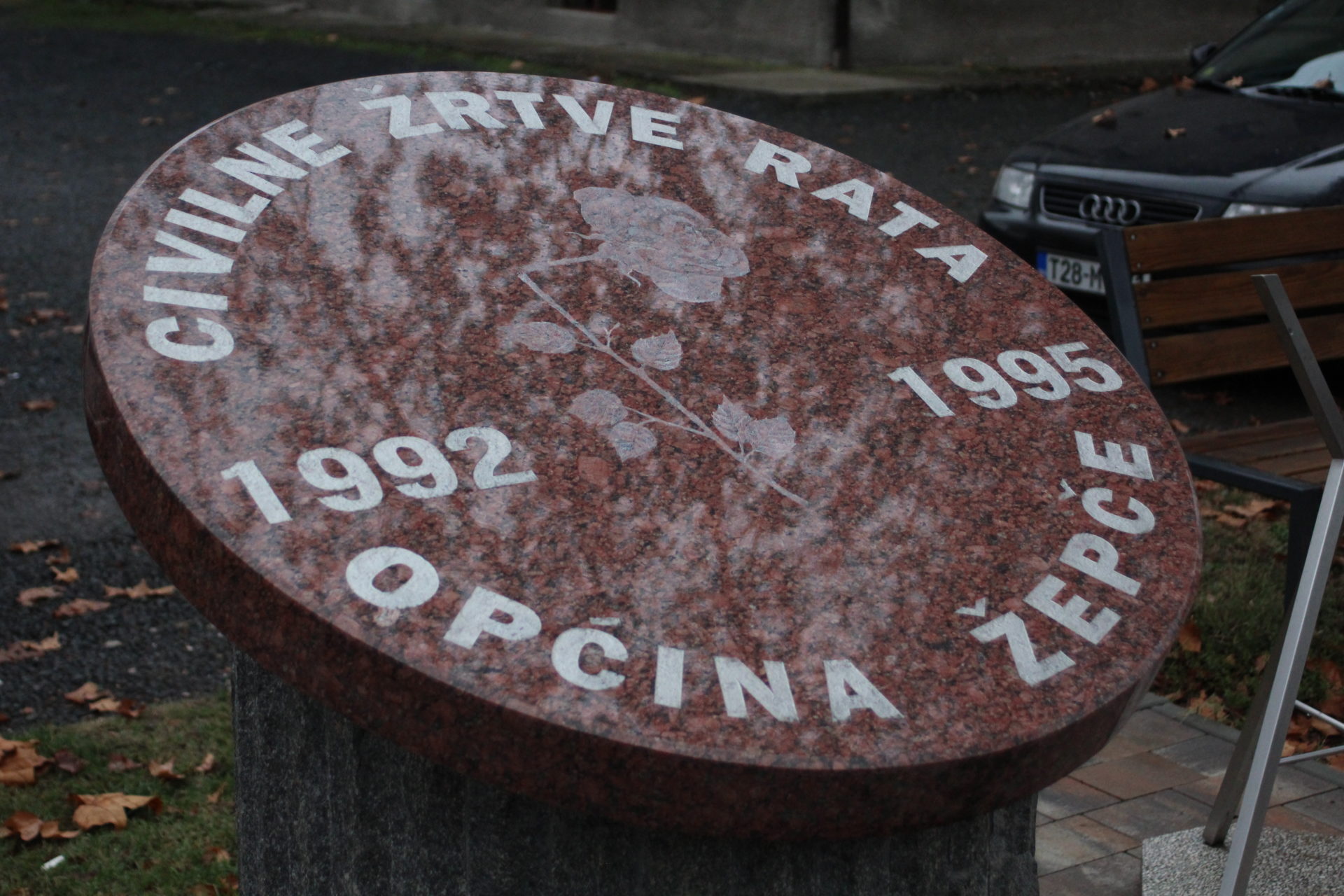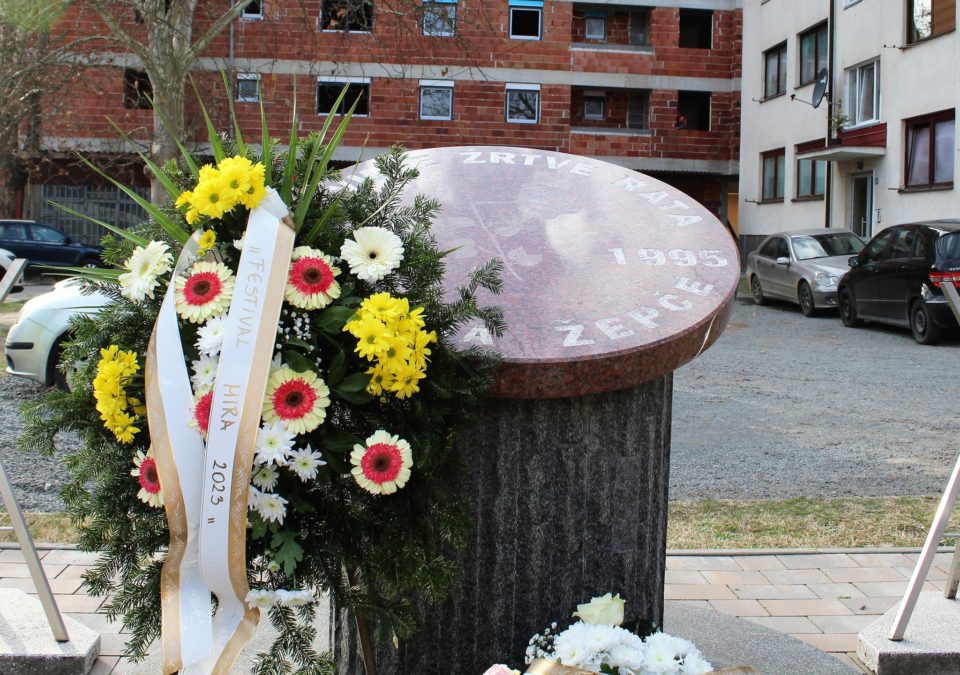
Žepče, a town predominantly populated by Croats and Bosniaks, often evokes issues concerning divisions and tensions. However, the newly reconstructed memorial to civilian victims of war, which was erected in 2017, brings a message of peace not only for young people, but also for all the citizens of this municipality.
Mato Zovko, municipal mayor, points out that the memorial is primarily a humane gesture and a brave decision, bringing a message of peace and of continued efforts to build good interpersonal, inter-ethnic and interreligious relations.
“The youth mostly follow in the footsteps of the elderly, that is, of their parents, and the message of peace is first instilled at home, and then passed on to others. We, the older generation, have to serve as an example of encouragement to the younger generation, in order to achieve co-operation and friendly dialogue. Youth relations in Žepče are good and they need to be enhanced through various social, cultural, sporting, and musical events, as well as through schools and other public institutions,” explains Zovko, adding that the memorial was met with approval by most of his fellow citizens.
The municipality of Žepče, in Zovko’s opinion, inherited many socio-political problems after the war. Buildings and infrastructure were demolished, citizens fled and were displaced, and lot of its citizens had died during the war. On top of that, there was the issue of dual authorities.
“We resolved one problem at a time through discussions, agreement and perseverance, and we primarily integrated all our institutions. We also received assistance in those efforts from international organizations, like the OHR, UN and others. That made it possible to build trust between people. We can serve as an example of how a multi-ethnic community can and should function,” continues Zovko.
Apart from this memorial, in Žepče there are also memorials to the Croat Defense Council (HVO) and the Army of Bosnia and Herzegovina, as well as victim commemoration rooms which serve as a reminder of the numerous fatalities on the territory of the municipality of Žepče during the 1992 – 1995 war.
However, Zovko believes that the joint memorial to the civilian victims of war can build co-existence and trust for the benefit of all citizens, primarily the future generations. On the occasion of the unveiling of this reconstructed memorial, the Association of Civilian Victims of War in Žepče organized a one-day visit by representatives of the international community to Žepče, including the Head of the OSCE Mission to Bosnia and Herzegovina, Ambassador Kathleen Kavalec, Swedish Ambassador to BiH Johanna Strömquist and UN Special Adviser on the Prevention of Genocide, Alice Wairimu Nderitu.
“The role of the international community is very important in resolving tense relations. However, victim associations are actually those who invest the biggest efforts in the implementation of initiatives such as this memorial in Žepče. Žepče is a town in which children attend classes together because they wanted that to happen, regardless of their ethnicity. They have a single school and that is the place in which ethnic tensions are not prominent. Support to reconciliation processes and confidence-building in the local community are a priority area of the international community’s engagement at the local level,” says Alen Ćosić, the OSCE Mission to BiH staff member working in Maglaj. He also announced new projects related to building better interethnic relations.
The youth of Žepče, although they attend classes together, often do not have an opportunity to actively spend time with each other, especially when they leave the town to go to a university in BiH, in the region, or abroad. Magdalena Barešić, a citizen of Žepče, says that a joint commemoration of all the victims, irrespective of their ethnicity or religion, contributes to empathy and to the understanding that people from all of the warring sides truly suffered and experienced a great loss.

“I think that it may be somewhat easier for the younger generations to turn towards the future and towards co-operation, but to see that people who were in the midst of the conflict during the war want so much to build peace and good relations need to be commended. Therein lays the greatness of this gesture. We, the young people, have to maintain the values of humanity, in the spirit of which we have to keep living and keep developing them together. The peace is now in our hands and it is far too precious for us to lose it,” says Magdalena.
Although young people in smaller local communities want to overcome nationalism and ethnonationalism, the social and political life reminds them of the realities they are up against, whether through hate speech in the public arena, the glorification of war criminals, or even through sports.
“The citizens of Žepče have risen above quarrels and denials long ago, and they live together. They share the same problems irrespective of their ethnicity: emigration, unemployment, salaries which are too low. I am especially glad to see that the joint memorial to civilian victims is here in Žepče, but politicians must be aware of the fact that the citizens of Žepče would rather gather in factories than in front of memorials,” highlights citizen J.P.
R.B., another young person from Žepče, agrees that, even in the past, the municipality of Žepče had been a positive example of good relations between persons of different ethnicities.
“The result of our joint efforts and of the fact that we live together is the enhanced development of the municipality of Žepče, which is today a middle-income municipality. Mutual respect resulted in the municipality of Žepče being the first municipality in BiH which constructed a joint memorial to the civilian victims of war. Young people advocate for ideas such as the memorial to civilian victims of war, and they are aware of the fact that they can ensure a better future for all the citizens of the municipality of Žepče only if they are together,” says R.B.
This memorial is just another indicator that memorials preserve the culture of remembrance and that they remind us of the victims, which should be equally respected and commemorated, regardless of their ethnicity. Young people play the leading role in facing the past and they represent a pillar of peace which, like the memorials, should never cease to exist.
_______________
This article was initially published within the first edition of MIR Magazine (2022/2023). MIR, which means ‘peace’ in Bosnian is an annual publication and platform for young inventive people developed by the Post-Conflict Research Center and Balkan Diskurs. It is dedicated to individuals and organizations that left us a legacy of strongly built foundations to continue our fight for peace and justice.






